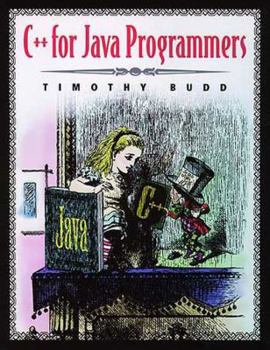C++ for Java Programmers
In C++ for Java Programmers, the student gets an introduction to C++ that enlists their Java programming skills to get them comfortably programming in C++. This title is an appropriate supplement for... This description may be from another edition of this product.
Format:Paperback
Language:English
ISBN:0201612461
ISBN13:9780201612462
Release Date:April 1999
Publisher:Pearson
Length:290 Pages
Weight:1.20 lbs.
Dimensions:0.6" x 7.5" x 9.2"
Customer Reviews
5 ratings
good book
Published by Thriftbooks.com User , 16 years ago
This is a good book highlighting the major differences between the two languages. The material is presented clearly.
Excellent Book
Published by Thriftbooks.com User , 22 years ago
This is a very good book. I read it in full. This book provides a very precise explanation of the concepts that one needs to know in C++. Also this book provides a clear comparison of the two languages C++ and Java. It explains the strengths of both the languages without any bias. Many of the C++ books tends to be tough to follow. This book is highly readable and explains even the difficult topics in a simple language with simple and easy to follow examples. The case studies are very good. I like the way Templates are introduced in this book and the container examples in the case study. Simple yet complete and precise.
Excellent Java vs C++ comparison guide
Published by Thriftbooks.com User , 23 years ago
This book was mistitled. It should have been "Differences Between Java And C++: A Crunch Translation Guide". Like an English-LanguageX translation guide (or a culture-to-culture translation guide, for that matter), this book is intended to identify the sorts of things that a Java developer jumping into C++ with no background in C++ would typically incorrectly presume or fail to correctly presume without having been told. To that end, this is an excellent, one-of-a-kind book that immediately immerses the reader into very significant and important differences between the languages regarding everything from syntax to compilation and execution. There is an interesting bit of detail about the philosophy, purpose, and objectives behind C++ which paints a significantly different picture in that realm than Java does, showing that in spite of the fact that Java and C++ look similar to the human eye, they are nothing alike (... but alike enough to be able to produce a "direct translation guide" like this book).This book assumes a) significant familiarity with Java, b) is familiar with, and respects and appreciates, what too many people think "doesn't really matter," like how computers work, computing history, etc., and c) basic existing familiarity with C++, at least enough for "Hello World!" and then some.I'd recommend this book to any Java programmer looking at C++ who has never done so but who has recognized that Java was born by C++ developers, and who has recognized that one can and should actively extend, and not indifferently coincide, new C++ skills on top of an existing fluency in Java. This book should be accompanied by other books--no book can do it all--but this is an excellent "Java/C++ translation guide".Due to the mistitling/mismarketing, I would give this a 9/10 but given only five stars it rounds up to five.
A very needed approach!
Published by Thriftbooks.com User , 24 years ago
I liked this book. It *is* a light, but helpful, introduction to most of the pifalls of C++ for a person who has worked with Java for some time. The problem is that the approach to memory allocation and the standard library tools are very different in Java and C++, while the syntax of both languages appear to be very similar; the author makes this point clear with examples. Compared with some standard references for C++, with lots of detail and almost thousand pages, this book is very readable and enjoyable. This is not a reference type of book, there are plenty of those out there. It is a book for those who reached OO programming via Java period.
XXXCellent!
Published by Thriftbooks.com User , 25 years ago
The author delivers exactly what his book title promises. I started out as a C programmer and beyond that did use C++ for some time. But then I moved on to using Java for 2 years. In the meantime the language added a number of feature like templates, exception handling and RTTI etc. This book provided me a v.easy path to catch-up with C++. Java provides Garbage collection and tight language specifications. Where as C++ leaves a lot of things to be implementation dependent (eg. shift operators on signed ints). The author does an excellent job of pointing out these nuances that could be otherwise be gotchas for Java programmers. One really gets over-reliant on a language's features, idioms of usage, libraries and rules. This book helps to shed this reliance on Java features you may have built.





